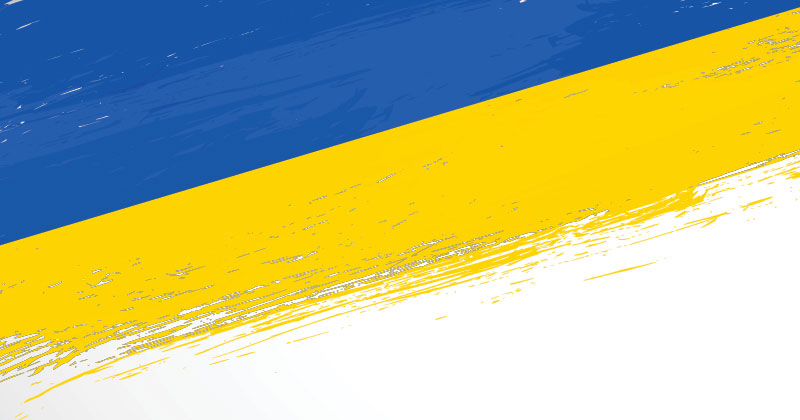


UD scholars discuss war in Ukraine
Illustration by Julie Morin March 10, 2022
Second in a four-part series held March 8
A staggering 2.1 million people are now refugees as a result of the war in the Ukraine, according to the U.N.’s refugee agency. The speed and scale of this exodus has been greater than any movement of people since World War II. Yet as grim as these statistics are, the outpouring of support also has been unprecedented, said Matthew Weinert, an associate professor in the University of Delaware Department of Political Science and International Relations, who made his remarks during a panel discussion, "World Disrupted: Ukraine and Global Order," held March 8 in the Trabant University Center and streamed online.
“This has been one of the most well-coordinated aid efforts in modern history,” noted Weinert. “As of March 1, $1.5 billion had been pledged for the Ukraine humanitarian appeals from U.N. agencies working on this effort. The humanitarian response to this crisis has been remarkable.”
Other political science professors and associate professors joining Weinert on the panel were Alice Ba, Daniel Green, Stuart Kaufman, Muqtedar Khan and Daniel Kinderman.
Kaufman, who was director for Russian, Ukrainian and Eurasian Affairs on the National Security Council staff for President Bill Clinton, said that one of the things that he has found notable is the speed at which NATO has gained in strength and effectiveness. Criticisms of NATO that might have been viewed as cogent two weeks ago are now delegitimized.
“Eastern Europeans were proved right in their fear of Russia,” he said. He also took issue with the argument that the West is hypocritical in its condemnation of Russia because the West has been violating other nations’ sovereignty for years. “The West has a right to oppose aggression now even if it was wrong on other issues in the past,” said Kaufman.
From Green’s perspective, the two greatest surprises of the invasion have been the severity of the economic sanctions by the West, and how poorly Russia is doing on the battlefield. “Russia is losing the war, or winning it so slowly that it looks like it is losing,” said Green. “Russia may become a paper tiger with nukes,” he added.
He noted that the sea change in international relations as a result of the war in the Ukraine is every bit as momentous as the collapse of the Soviet Union in 1989. Khan also devoted part of his remarks to the dramatic shift in the global political landscape.
“We are witnessing a shift in certain global powers,” said Khan, who predicts that the war in Ukraine “could unleash a military shopping spree in Germany.” Currently, the U.S. has the world’s largest military budget, followed by China and India. Khan predicts that Germany could displace India as the third largest spender on its military.
Kinderman also believes that the “impact on German politics is seismic.” Since the end of World War II, there has been an anti-military sentiment in Germany but he believes there will now be a “new normal of supporting defense spending.”
Ba delved into the implications of the war in the Ukraine for the Indo-Pacific and China. She found it noteworthy that India and Vietnam abstained from voting during a special emergency session on March 2 when the U.N. General Assembly passed a resolution condemning Russia’s invasion of Ukraine. Both countries rely on Russia for military equipment. But as for Russia-China relations, she said that Russia is far more dependent on China, and even more so now, after the invasion. Economic sanctions have greatly impacted Russia’s economy and left it dependent on China for trading, banking and more.
Two more events will be held in the war in Ukraine series. On Monday, March 14, three European scholars will explore how their home countries are managing the chaos. This event takes place at 12:30 p.m., EDT and will be on Zoom: https://udel.zoom.us/j/91650325852?pwd=WHUvOEVaY0FaZzVlL2tBSWI5aEVjZz09.
Then, at 3:30 p.m. on March 14, scholars from UD’s Department of Political Science and International Relations and the Alfred Lerner College of Business and Economics will hold a discussion focused on the economic fallout of the war on Ukraine and sanctions on Russia. This event will be held in Gore Recital Hall of the Roselle Center for the Arts and online at https://sites.udel.edu/udlive.
Contact Us
Have a UDaily story idea?
Contact us at ocm@udel.edu
Members of the press
Contact us at mediarelations@udel.edu or visit the Media Relations website

